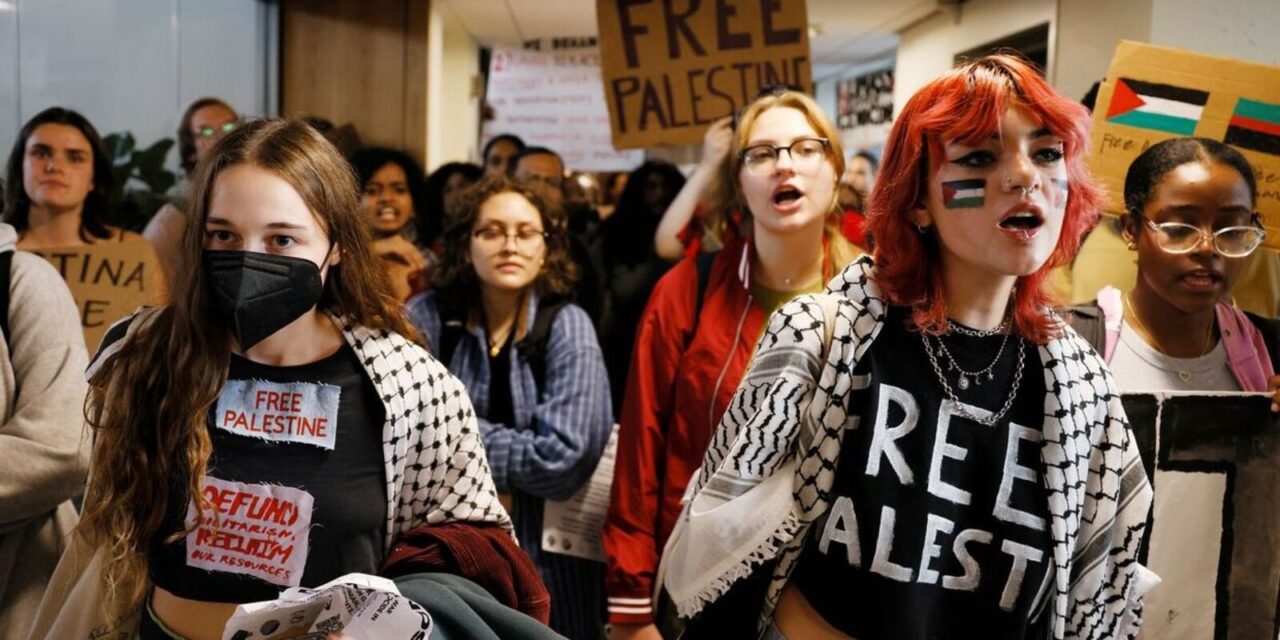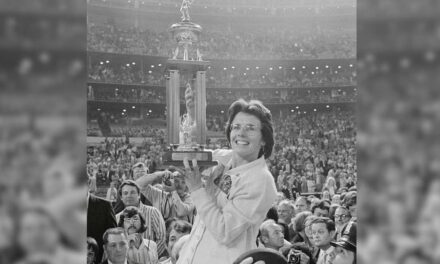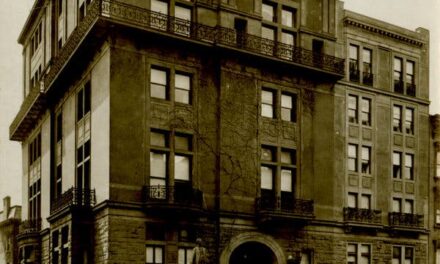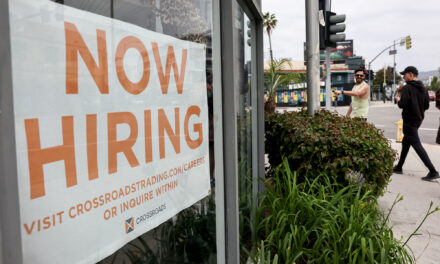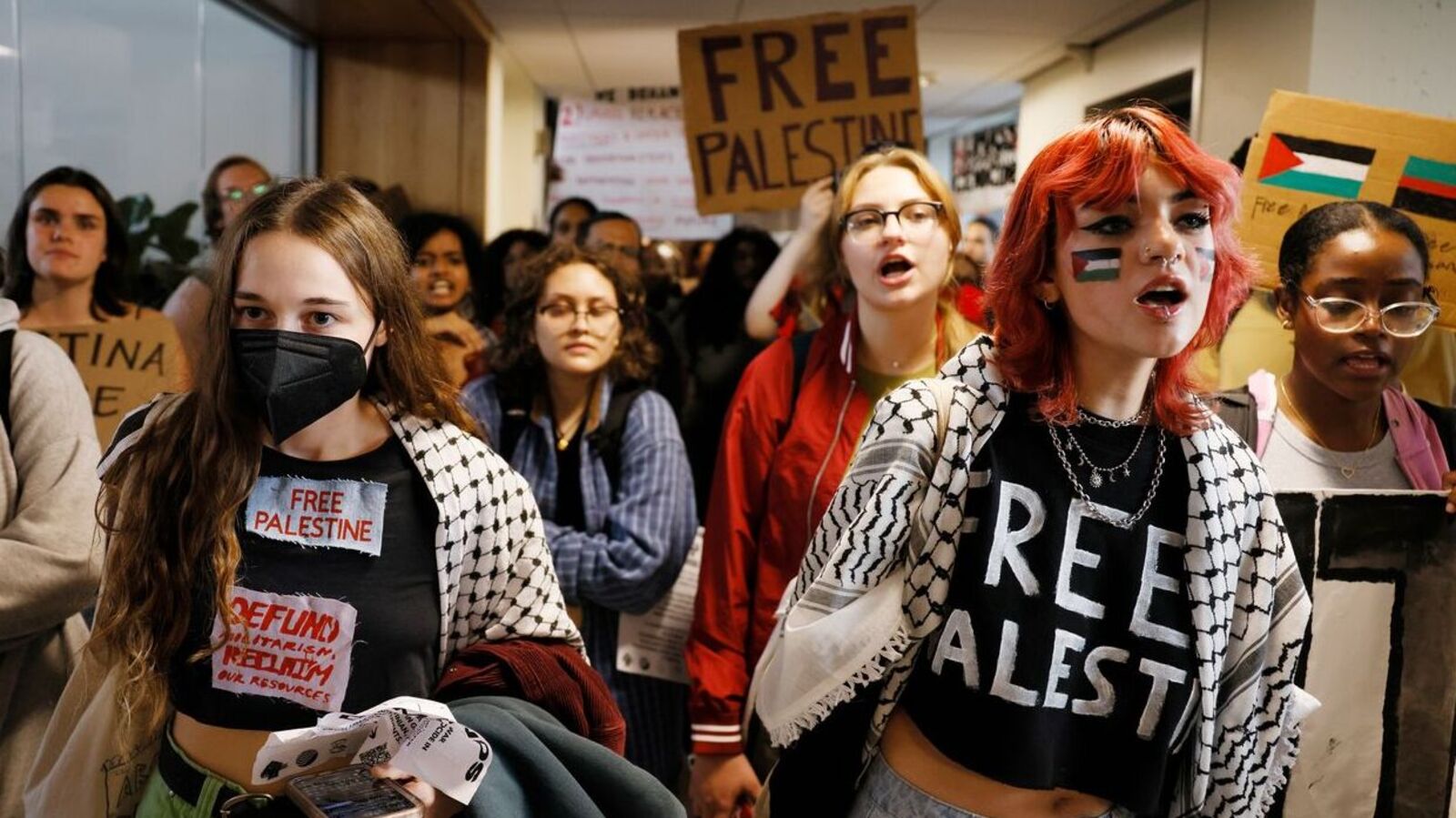
Mullen is white, her parents were raised Catholic and she grew up in an upper middle class Boston suburb. Her political awakening—along with those of tens of thousands of her generation now enrolled at college—is fueling a surge of campus unrest not seen since the Vietnam War.
A wave of pro-Palestinian protests have swept college campuses, leading to heightened tensions, counterprotests and, in some cases, violence. The conflict has also exposed a generational divide, with many older Americans surprised at the protests’ scope and intensity.
Mullen and other pro-Palestinian college demonstrators say their activism is rooted in a deeply held conviction that the world is divided between the oppressed and their oppressors.
That view frames the suffering of an array of populations, they say, including low-income families being evicted from their homes, Black and brown people who encounter brutal treatment by the police, migrants turned away from safe haven at the border and, in the current conflict, Palestinians struggling to wrest control of territory from the Israelis.
“Gaza is not a two-sided war,” said Mullen, who is 21. “What is happening is the resistance of the oppressed against their oppressor.”
The protesters’ sympathy for Hamas, designated by the U.S. as a terrorist group, sometimes astonishes and rankles bystanders. Roughly half of Americans 18 to 24 years old think Hamas’s October attack was justified by grievances of the Palestinians, according to a Harvard Harris Poll. Just 9% of people aged 65 and older feel the same.
The activists at pro-Palestinian events include a range of student groups who say they can draw a direct line from the causes they support to the plight of Palestinians in Gaza.
In one protest earlier this month, University of Pennsylvania Students Against the Occupation were joined by groups including Fossil Free Penn, Police Free Penn, Save UC Townhomes and Students for the Preservation of Chinatown at a demonstration outside a board of trustees meeting.
Participants seamlessly shifted between calls for a cease-fire in Gaza and concerns about fair wages for graduate students, the police presence on Penn’s campus, the university’s endowment choices and opposition to the construction of a new 76ers basketball arena in center-city Philadelphia.
“Occupation is a crime, from West Philly to Palestine!” the group of about 50 students and others shouted.
“All oppressed and displaced people are fighting for their right to return,” declared one speaker, who, like most people in the audience, wore a mask covering his face. “From 40th and Market to Palestine, this is the same struggle.”
Last month, Brown University’s Students for Justice in Palestine chapter issued a statement that said the group held “the Israeli regime and its allies unequivocally responsible for all suffering and loss of life, Palestinian or Israeli.” It was endorsed by more than 40 other student groups, including the Teaching Assistant Labor Organization, Burlesque at Brown, Brown Beekeeping Society and Poler Bears, a pole-dancing performance group.
Generational shifts
Today’s college students entered elementary school as fire drills gave way to active-shooter drills and their parents navigated the 2008 recession. They came of age as the climate crisis gained attention and the 2016 election of Donald Trump polarized their communities.
Their schools closed during the pandemic, then streets shut down for protests following the murder of George Floyd. Now they are struggling with high rates of anxiety and depression as they prepare to enter an economy in which income inequality is near all-time highs.
Nearly half of 18- to 29-year-olds favor socialism—more than those who support a market economy, which many blame for the compounding disasters they face, according to a 2022 poll from Pew Research.
Noah Thompson, a 24-year-old senior at the University of Oregon, works in a university dining hall to put himself through school. Raised by a single mother, he believes too much of the nation’s wealth has accrued to the most affluent, and capitalism is skewed to help the rich and exploit the poor. He said he’s troubled by war profiteers selling arms to Israel, who then use the weapons to kill children, and has helped organize a “No Money for Massacres” campaign to promote a cease-fire in Palestine.
“There always seems to be enough money, bombs, for war, for intervention abroad, and never enough money for education, for healthcare, for creating a better and secure society for us here now,” he said.
Some student protesters have minimized the brutality of the Oct. 7 attack by Hamas, when militants killed more than 1,200 Israeli civilians, including concertgoers and children, and took 240 hostages. Health authorities in the Hamas-run Gaza say more than 13,000 people had been killed there in the war.
Some protesters have referred to the attack in demonstrations and public statements as an “armed uprising” or “act of resistance.” That framing has been particularly abhorrent to Jewish leaders, who have called on campus administrators to denounce such language as antisemitic.
Many who support the Palestinian cause on campuses say they’re uncomfortable speaking publicly for fear of being harassed or called antisemitic. Trucks have circled some campuses, including at Harvard and Columbia, identifying the names and faces of students accused of blaming Israel for the Hamas attack. Ads for many rallies encourage attendees to wear masks to protect their anonymity, not take pictures and avoid reporters.
College presidents are struggling to navigate between championing free speech, mollifying outraged alumni and protecting Jewish and Arab students from harassment. Universities in recent weeks have announced advisory committees, task forces and research centers to address rising antisemitism.
At Columbia University, a male student was hit with a wooden stick after he confronted a female student who was ripping down posters advertising a rally supporting Israel. At both Tulane University and the University of Massachusetts, Palestinian supporters punched Jewish students during protests. At Cornell University, a student was charged with threatening to shoot up a kosher dining hall. Students at schools across the country have torn down or scribbled over posters of Israelis who are being held hostage by Hamas in Gaza.
‘Never capitulate’
One theme prominent at protests across the country is the opposition to “settler colonialism,” or violent empire building that displaces an indigenous community. Zionism—support for Israel as a Jewish state—is viewed by many college protesters as the modern equivalent to European colonization of the Americas and Africa.
“We will never capitulate to the colonizer or his sympathizers,” the George Washington University Students for Justice in Palestine said on their Instagram account. “The settler colony will fall, our land will be liberated, and we will return to our homes again.”
Classes on the history and experiences of previously marginalized communities have become more prevalent on campuses in disciplines like African-American studies, women’s and gender studies and Middle Eastern studies. Universities began focusing on courses that reached beyond the Western canon about 50 years ago, in response to a more racially diverse student body, said Rachel Fish, a special adviser to the Brandeis University’s presidential initiative to counter antisemitism in higher education.
“It seems so obvious when you’re watching it from halfway across the world that there’s this genocide going on,” said Price Little, a 21-year-old senior at the University of San Francisco, who grew up in rural Mariposa, Calif. He wrote a column for the local paper about his take on Black Lives Matter and world affairs, but had little direct exposure to any conflicts himself.
College brought new encounters with students from a range of backgrounds, which Little said was eye-opening. With a double major of French studies and fine arts, he signed up for classes about areas colonized by the French empire, Islamic art and theology. He became best friends with a Pakistani American student and joined a South Asian student group, and more recently the Arab Student Union and Muslim Student Association.
Last month he stayed on after a club event, as some of the students began discussing plans for a rally.
“I sat in for a few hours on that, just in the corner, listening,” Little recalled. He knew that Hamas had attacked and Israel was striking back with bombs, but said being in that room was a galvanizing moment. “This was not something where I knew the brutal extent of all of it. That’s when it became more of an active mission for me,” he said.
A few weeks ago, Little joined in a pro-Palestinian rally, his sign reading, “Queer Muslims for Palestine.”
Little, who identifies as queer and isn’t Muslim, said he doesn’t condone Hamas’s treatment of queer people. Same-sex relations are outlawed in Gaza and punishable by up to 10 years in prison, according to Human Rights Watch.
“It’s not ideal,” he said of supporting a resistance movement led by Hamas. “But I don’t think there was another option.”
Mullen, from UMass, said criticism of Hamas is often used to undermine the legitimacy of the Palestinian movement. She said she feels “deep sympathy for everyone involved” and doesn’t approve of the Oct. 7 attack, but said it wasn’t unprovoked.
Israel set the stage for violence by condemning Palestinians to live in “an open air prison or a concentration camp,” she said. “I think the way that the media portrays it makes it very difficult to understand but in reality it is a pretty straightforward conflict.”
Mullen began following the conflict in Israel and Gaza in October, after a few years mainly on the sidelines of political movements. She said she was confident in her understanding of the power dynamics in the Gaza Strip since Israel pulled out in 2005, but less familiar with the historic events that led to that point.
Friends from school showed her the Instagram feeds of several Palestinian journalists and she began reading Al Jazeera’s website. She saw photographs of Palestinian families buried in rubble and Gazan women holding their dead children. The carnage propelled her to act, she said. Mullen now wears a denim patch on her jacket that says “Free Palestine.”
Last month, Mullen was among about 500 UMass students who protested the school’s connection to an arms manufacturer and demanded the school condemn Israel’s actions in the war. Roughly 100 lined the hallway outside the university chancellor’s office, draping themselves with Palestinian scarves known as kaffiyehs and sporting Palestinian flags and signs like “Stop U.S. Aid to Apartheid Israel!”
A UMass Amherst spokesman said students were warned to leave or risk facing arrest when the building closed at 6 p.m.
Police placed Mullen’s hands behind her back and cuffed them with white zip ties around her wrists, she said. When she walked out of the office, supporters cheered and chanted, “One, two, three, four, we don’t want your dirty war!”
She said she felt proud, energized and empowered to use her “privilege as a white person” to speak out for people who are unable to speak for themselves.
“I felt I couldn’t sit back and see these images and just move on,” she said. “This is a moment in history that we have learned about over and over again, with different movements in the past, different things happening in the past when you’d say, ‘If I was there, I would have done something about it.’”
Write to Douglas Belkin at Doug.Belkin@wsj.com and Melissa Korn at Melissa.Korn@wsj.com
Milestone Alert!
Livemint tops charts as the fastest growing news website in the world 🌏 Click here to know more.

